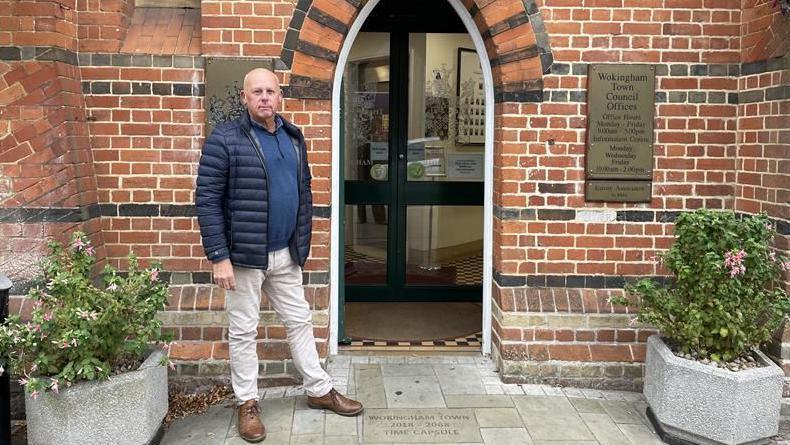The female pilot 'showing the men how it was done'
Secret Berkshire: The pilot who swam to shore
- Published
Winnifred "Winnie" Spooner was one of England's most daring pilots, flying around the world and winning accolades in the 1920s and 30s.
One of the first women to receive her pilot's licence in 1927, she was the first woman in the King's Cup Air Race and won the Harman Trophy for being the world's outstanding aviatrix in 1929, aged 29.
In 1931, she made national newspaper headlines after swimming for more than two hours to reach help following a crash in the sea off Italy.
She returned to a hero's welcome in her home town Wokingham, Berkshire, arriving at the Town Hall on a fire engine.
But three years later, Winnie's trailblazing life came to an abrupt end when she died of pneumonia.
BBC Radio Berkshire's Lorin Bozkurt went to meet local historian Richard Gibbs to uncover more of Winnie's incredible story.
Living in the town's South Drive, Winnie became known "not just because she had her aircraft flying and buzzing above - very few aircraft in the day so this was remarkable in itself - but she was also one of the first lady [car] drivers of the town", said Mr Gibbs.
"She had a bit of a reputation for driving a wee bit fast," he said.
"Winnie, for whatever reason, decided to take on an adventure which even for men at that time was somewhat unusual. She decided she was going to learn to fly."
During World War One, aeroplanes were "made of matchsticks covered in paper" but the industry was "still at the forefront of technology", said Mr Gibbs, adding: "Quite simply, young women did not go into that sort of thing."
Born in Kent in 1900, Winnie took flying lessons and got her licence in 1927, becoming the eighth woman in England to be a qualified certified pilot.

Historian Richard Gibbs stands at the entrance to Wokingham Town Hall where Winnie Spooner received a hero's welcome
The first race she won was in Hadley, Suffolk, in 1928 beating three male pilots, the historian said.
"That really just gives an indication that this was very much a male-dominated area.
"In the midst of this was this, at this point in time, 28-year-old woman suddenly showing the men how it should be done."
More from Berkshire
British Rowing permitted to revamp training base
- Published31 October
Former Dell HQ demolition has council backing
- Published31 October
The gothic ruin that became a horror film landmark
- Published31 October
Winnie won the Harman Trophy in 1929, one year before Amy Johnson, the pioneering English pilot who was the first woman to fly solo from London to Australia.
Mr Gibbs said: "Winnie hadn't really done long-distance flying in the sense of trying to prove points, which is what Amy Johnson and the others had done.
"But what Winnie tried to do was to see whether or not you could get from London to Cape Town in less than five days."
'Large explosion'
Setting off with co-pilot Flt Lt Edwards, Winnie made it to Italy before disaster struck, he said.
"Things were going well, as Winnie explains in her own words in her diary.
"She says: 'We took off, things were going really well... I sat back to have a bit of a doze and then the next thing we knew, there was a large explosion and the plane was heading down to the sea'.
"They were now in the middle of the ocean, away from the coast of Italy."
Her co-pilot was injured and Winnie decided to swim for help, said Mr Gibbs.
After two hours, the aviator reached an Italian beach and was able to raise the alarm and Flt Lt Edwards was saved, he said.
But Winnie "didn't like" the attention, said Mr Gibbs. "She was quite withdrawn in that respect."
'Irony of ironies'
The then mayor of Wokingham declared Winnie a world heroine, and she was celebrated on her return at the Town Hall.
But to the community, "she was our Winnie", said Mr Gibbs.
"I think very much they saw her and recognised her as a world-class hero but it was very much Winnie was 'our local girl'.
"Her brothers were around in the town, she was very much around in the town and part of it, which is what I think endeared people to her.
"I think what we can learn from her life is that you you go for it, you do it.
"A lot of people after such a dramatic event, a near-death experience, potentially would have given up but she didn't."
She continued to work as a private pilot, flying a local MP around the UK and overseas, he said.
"Then irony of ironies, for somebody that had done so much in her life, she caught a cold.
"It turned into pneumonia, which was quite prevalent at the time.
"Sadly, she died at the age of 33, and it might well be partly because of that that we know of Amy Johnson but few people will know the name of Winifred Spooner."
Secret Berkshire
Explore fascinating stories from Berkshire
Listen and subscribe for the latest episode of Secret Berkshire
Get in touch
Do you have a story BBC Berkshire should cover?
You can follow BBC Berkshire on Facebook, external, X (Twitter), external, or Instagram, external.